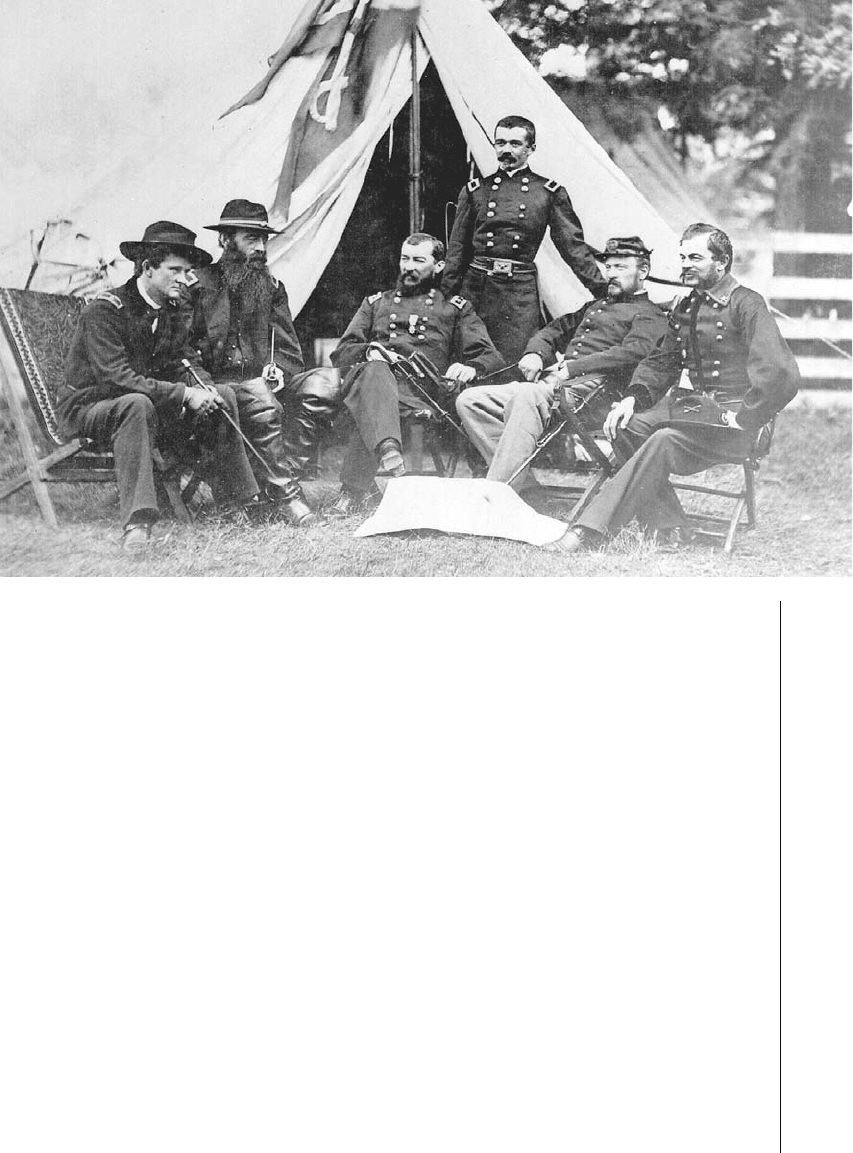Hillstrom K., Hillstrom L.C., Baker L.W. (ed.) - American Civil War. Almanac
Подождите немного. Документ загружается.


T
he North continued to roll toward victory during the first
months of 1865. Exhausted by the long war, the South’s
military and civilian population proved powerless to stop the
Union forces as they moved across the Confederate country-
side. In early April, the South suffered two crushing blows when
Federal troops captured both Petersburg and Richmond in Vir-
ginia. Rebel general Robert E. Lee (1807–1870) surrendered a
few days later, ending the South’s bid for independence.
People of the North joined together in tremendous
celebrations when they learned of Richmond’s capture and
Lee’s surrender. But their joy at winning the war turned to
sorrow on April 14, 1865, when John Wilkes Booth
(1838–1865) assassinated President Abraham Lincoln
(1809–1865). Lincoln had successfully guided the Union
through the most troubled period in its history. His death
plunged the North into an angry and mournful mood.
Last days of the Confederacy
By the beginning of 1865, most Southerners recog-
nized that a Union victory seemed inevitable. The Southern
217
13
1865: Victory for the North
Civil War Almanac MB 10/7/03 4:02 PM Page 217

economy was in ruins, destroyed by
the North’s naval blockade and its oc-
cupation of large sections of Confeder-
ate territory. This economic collapse
made it a struggle for Southerners to
obtain food and clothing for them-
selves and their families.
Battlefield losses and supply
shortages also took their toll on Con-
federate armies, which decreased in
size with each violent clash. Depressed
and exhausted by long months of
fighting, many Southern soldiers de-
serted their units. Others stayed with
the army, but their hunger and weari-
ness made it difficult for them to be
effective. The morale of these valiant
but battered soldiers plummeted even
lower in February, when Union gener-
al William T. Sherman (1820–1891) re-
sumed his destructive march through
the South.
Lee remains trapped in
Petersburg
On February 1, 1865, General
Sherman marched his sixty thou-
sand–man army northward out of Sa-
vannah, Georgia. His goal was to
move all the way up the Atlantic
coastline to Petersburg, Virginia,
where Union general Ulysses S. Grant
(1822–1885) awaited his arrival.
Months earlier, Robert E. Lee
and his Army of Northern Virginia
had been forced to retreat to Peters-
burg in order to prevent Grant’s Army
of the Potomac from capturing the
Confederate capital of Richmond.
Richmond received most of its food
and supplies from railroads that
American Civil War: Almanac218
Words to Know
Blockade the act of surrounding a harbor
with ships in order to prevent other
vessels from entering or exiting the
harbor; the word blockade is also
sometimes used when ships or other
military forces surround and isolate a
city, region, or country
Civil War conflict that took place from
1861 to 1865 between the Northern
states (Union) and the Southern seced-
ed states (Confederacy); also known in
the South as the War between the
States and in the North as the War of
the Rebellion
Confederacy eleven Southern states that
seceded from the United States in
1860 and 1861
Enlistment the act of joining a country’s
armed forces
Federal national or central government;
also refers to the North or Union, as
opposed to the South or Confederacy
Rebel Confederate; often used as a name
for a Confederate soldier
Siege surrounding and blockading of a
city, town, or fortress by an army at-
tempting to capture it
Treason betrayal of one’s country
Union Northern states that remained loyal
to the United States during the Civil
War
Civil War Almanac MB 10/7/03 4:02 PM Page 218

passed through Petersburg, which is
twenty-three miles south of the capi-
tal city. If those railways were cap-
tured, the capital would have to sur-
render or face starvation.
Lee’s defense of Petersburg pre-
vented the Army of the Potomac from
swooping in and capturing Richmond.
But Grant’s decision to lay siege to Pe-
tersburg prevented the Confederate
defenders from moving anywhere else
for the rest of 1864. Grant’s siege kept
Lee’s troops trapped in Petersburg for
month after month, even as Union
armies in the West carved up large sec-
tions of Confederate territory.
Sherman moves through
South Carolina
Grant’s continued siege of Pe-
tersburg made it impossible for Lee to
send the Army of Northern Virginia
against Sherman’s invasion. Lee could
only stand by helplessly as Sherman
left Georgia and plowed northward
through South Carolina, leaving a trail
of ruined crops and burning buildings
in his wake.
Sherman’s march through
South Carolina resembled his late-
1864 invasion of Georgia in some
ways. Just as in Georgia, his Union
troops fed and clothed themselves by
taking whatever they needed from
Southern homeowners, farmers, and
shopkeepers. In addition, Sherman’s
army continued to destroy unused
crops and set fire to buildings, just as
it had done during its “March to the
Sea” a few months before.
1865: Victory for the North 219
People to Know
John Wilkes Booth (1838–1865) actor
who assassinated Abraham Lincoln
Jefferson Davis (1808–1889) president
of the Confederacy, 1861–65
Ulysses S. Grant (1822–1885) Union
general who commanded all Federal
troops, 1864–65; led Union armies at
Shiloh, Vicksburg, Chattanooga, and
Petersburg; eighteenth president of the
United States, 1869–77
Joseph E. Johnston (1807–1891) Con-
federate general of the Army of Ten-
nessee who fought at First Bull Run and
Atlanta
Robert E. Lee (1807–1870) Confederate
general of the Army of Northern Vir-
ginia; fought at Second Bull Run, Anti-
etam, Gettysburg, Fredericksburg, and
Chancellorsville; defended Richmond
from Ulysses S. Grant’s Army of the Po-
tomac, 1864 to April 1865
Abraham Lincoln (1809–1865) six-
teenth president of the United States,
1861–65
Philip H. Sheridan (1831–1888) Union
major general who commanded the
Army of the Potomac’s cavalry corps
and the Army of the Shenandoah; also
fought at Perryville, Murfreesboro,
Chickamauga, and Chattanooga
William T. Sherman (1820–1891) Union
major general who commanded the
Army of the Tennessee and the Military
Division of the Mississippi, led famous
“March to the Sea”
Civil War Almanac MB 10/7/03 4:02 PM Page 219

fire, but others called the fire an acci-
dent or blamed it on fleeing Southern-
ers. In any event, Sherman’s march
through South Carolina left the state in
ruins. “All is gloom, despondency [loss
of hope or courage], and inactivity,” ad-
mitted one South Carolina native. “Our
army is demoralized and the people
panic stricken. To fight longer seems to
be madness.”
Desperation in the
Confederacy
In March, Sherman’s Army of
the Mississippi left South Carolina and
But Sherman’s troops treated
South Carolina even more harshly than
they had treated Georgia. South Caroli-
na had been the first state to secede
from the United States, and Sherman
and the members of his army wanted
to punish it for its leading role in estab-
lishing the Confederacy. As a result, the
invading Union army looted South
Carolina homes and burned South Car-
olina farmlands with great enthusiasm.
The state capital of Columbia went up
in flames, too, although people contin-
ue to disagree about how the fire got
started. Some observers insisted that
Federal troops purposely set the city on
American Civil War: Almanac220
Union general William T. Sherman (leaning against the back of a cannon) discusses strategy
with his staff. (Photograph by George N. Barnard. Courtesy of the Library of Congress.)
Civil War Almanac MB 10/7/03 4:02 PM Page 220

entered North Carolina. Meanwhile,
Confederate defenses continued to
crumble elsewhere in the South. Over
in Virginia, Union troops under the
direction of General Philip H. Sheri-
dan (1831–1888) conducted a series of
successful raids as they moved east-
ward to join Grant at Petersburg. In
Alabama and Georgia, a young Union
general named James H. Wilson
(1837–1925) defeated Confederate
cavalry forces led by the legendary
Nathan Bedford Forrest (1821–1877)
to take control of several important
cities. And in North Carolina, Union
forces captured the port city of Wilm-
ington, which had been the last re-
maining Confederate port open to
blockade runners (supply ships that
tried to carry provisions past the
Union’s naval blockade).
As Sherman’s troops pushed
through North Carolina, they were re-
inforced by twenty thousand troops
under the command of John Schofield
(1831–1906). The addition of Scho-
field’s men increased the size of Sher-
man’s army to more than eighty thou-
sand troops, far bigger than any
Confederate army in the region. Con-
federate general Joseph E. Johnston
1865: Victory for the North 221
Union major general Philip H. Sheridan sits in front of his tent with his staff. (Courtesy of the
National Archives and Records Administration.)
Civil War Almanac MB 10/7/03 4:02 PM Page 221

voiced strong objections to the idea of
fighting side-by-side with blacks. Much
of this resistance came from deep-seat-
ed racism. These bigoted critics argued
that slaves did not have the intelli-
gence or discipline to be good soldiers,
and they declared that they would be
deeply offended if blacks were asked to
help defend the Confederacy.
Other Southerners objected to
the idea of enlisting slaves for more
practical reasons. They noted that few
slaves would willingly join the Con-
federate Army unless they were
promised their freedom. They warned
that the South’s slave-based economy
might be permanently damaged if
large numbers of slaves were freed.
Still other critics worried that if the
South voluntarily armed blacks, the
slaves might revolt against their own-
ers. More than anything else, though,
white opposition to the idea of adding
blacks to the Confederate Army
stemmed from the belief that fighting
with blacks would spoil the nobility of
the Southern cause. “Many Southern-
ers apparently preferred to lose the
war than to win it with the help of
black men,” observed James M.
McPherson in Battle Cry of Freedom.
By February 1865, however,
important Confederate leaders like
President Jefferson Davis (1808–1889)
and General Lee announced their sup-
port for the use of black troops. “The
negroes, under proper circumstances,
will make efficient soldiers,” wrote Lee
on February 18. “I think we could at
least do as well with them as the
enemy.” The general added that blacks
(1807–1891) tried to halt Sherman’s
progress with a force of twenty thou-
sand troops. But the Union comman-
der brushed him aside with ease as he
continued his march for Petersburg.
The Confederacy considers
using blacks as soldiers
As Union victories piled up
during 1864 and early 1865, a small
number of Southern lawmakers and
community leaders suggested adding
slaves to the Confederate Army. At
first, whites across the Confederacy
American Civil War: Almanac222
Union major general John M. Schofield.
(Photograph by Mathew B. Brady. Courtesy of the
Library of Congress.)
Civil War Almanac MB 10/7/03 4:02 PM Page 222

who fought under the Confederate
flag should be given their freedom
after the war. “It would be neither just
nor wise . . . to require them to serve
as slaves [after the war],” he said.
In mid-March, Confederate
lawmakers passed several preliminary
bills designed to legalize the use of
African Americans as Confederate sol-
diers. The Virginia legislature even
passed a state law calling for the en-
listment of black soldiers. Virginia
managed to organize two companies
of black soldiers to fight on behalf of
the South within a few weeks of pass-
ing the law. But as it turned out, the
war ended before they or any other
black Confederate soldiers could take
the field of battle.
Passage of the Thirteenth
Amendment
At the same time that Confed-
erate lawmakers debated about using
slaves in their army, President Lincoln
pushed for passage of the Thirteenth
Amendment to the U.S. Constitution.
This amendment abolished slavery all
across the nation.
Lincoln knew that passing an
amendment to the U.S. Constitution
required a great deal of work. For any
amendment to become law, it has to
be approved by both the U.S. Senate
and the U.S. House of Representatives.
It then has to be ratified (approved) by
three-fourths of the states before it can
become law. Despite these obstacles,
however, Lincoln offered strong sup-
port for the amendment after his 1864
reelection.
The U.S. Senate had passed the
amendment back in December 1863,
but it had stalled in the House of Rep-
resentatives. Lincoln and other
amendment supporters worked hard
to send the bill back to the House, and
on January 31, 1865, the U.S. House of
Representatives passed it despite op-
position from many Democrats. After
the vote, representatives who had sup-
ported the amendment burst into cel-
ebration. “Some [members] embraced
one another, others wept like chil-
dren,” recalled Indiana congressman
George W. Julian (1817–1899). “I have
felt, ever since the vote, as if I were in
a new country.”
The House’s passage of the
amendment cleared the way for indi-
vidual states to vote on the bill. Ten
months later, on December 18, 1865,
the Thirteenth Amendment became
law, ending slavery on American land
forever.
Grant increases pressure on
Petersburg
By the end of March, Northern
military actions and occupations had
reduced the Confederacy to tatters.
The only remaining Confederate army
of any significance was Lee’s Army of
Northern Virginia, numbering fewer
than fifty thousand troops. But it re-
mained trapped in Petersburg, sur-
rounded by an army more than twice
its size.
Lee recognized that his army
would be destroyed if it remained in
Petersburg. Sherman’s army was draw-
ing ever closer. The Confederate gen-
1865: Victory for the North 223
Civil War Almanac MB 10/7/03 4:02 PM Page 223

Southern mobs looted and burned
large sections of the city.
As Richmond went up in
flames at the hands of its own citi-
zens, Jefferson Davis and a number
of important Confederate officials
fled for North Carolina. They
stopped in Danville, where Davis
proclaimed that “I will never consent
to abandon to the enemy one foot of
the soil of any of the States of the
Confederacy. Let us . . . meet the foe
with fresh defiance, with uncon-
quered and unconquerable hearts.”
Danville was named the new capital
of the Confederacy, but it held the
title for just one week before Davis
was forced to flee again. Acknowledg-
ing that the North had taken control
of most Confederate land east of the
Mississippi River, Davis decided to
make a run for Texas.
Lee surrenders to Grant
General Lee and his dispirited
Army of Northern Virginia also evacu-
ated Petersburg and Richmond on
April 2. Lee moved his exhausted army
southward in a desperate bid to join
forces with Johnston’s twenty thou-
sand–man force, but the Army of the
Potomac immediately gave pursuit.
Lee’s reduced army of thirty-five thou-
sand men pushed on, spurred by their
deep devotion to their commander.
But on April 7, Union cavalry under
the direction of Sheridan stopped their
progress near the little town of Appo-
mattox (pronounced app–uh-MAT-
tux). As tens of thousands of addition-
al Federal troops closed in from all
eral knew that the addition of those
eighty thousand troops to Grant’s
Army of the Potomac would make his
foe even more powerful. Reviewing
the situation, Lee decided to strike be-
fore Sherman arrived. On March 25,
he ordered a desperate attack on Fort
Stedman, a Union position outside of
Petersburg. He hoped to punch a hole
through Grant’s line so that he could
escape Petersburg and join forces with
Johnston’s small army to the south.
The Army of Northern Vir-
ginia fought valiantly, but Grant’s
forces pushed back the assault. As
Lee’s weary soldiers retreated back to
their former positions, Grant decided
to launch a strike of his own. On April
1, twelve thousand Federal troops led
by General Sheridan defeated a small
rebel force commanded by George
Pickett (1825–1875) at a place called
Five Forks, fifteen miles west of Peters-
burg. Sheridan’s victory enabled the
North to seize the last remaining rail-
way line that had been providing sup-
plies to Petersburg and Richmond.
Grant captures Petersburg
and Richmond
When Grant learned of the
Union victory at Five Forks, he knew
that the South’s last hope of saving Pe-
tersburg and Richmond had been
crushed. Eager to press his advantage,
he ordered a full assault on the Con-
federate defenses at Petersburg. The
Union offensive forced the Confeder-
ates to evacuate both Petersburg and
Richmond. Before fleeing Richmond,
American Civil War: Almanac224
Civil War Almanac MB 10/7/03 4:02 PM Page 224

sides, Lee finally acknowledged that
the war had been lost.
On April 8, General Grant sent
Lee a note asking him to surrender.
Looking over the brave but battered
remnants of his Army of Northern Vir-
ginia, Lee realized that he had no other
choice. Writing in The Civil War, histo-
rian Bruce Catton noted that Lee’s deci-
sion to surrender “came just as Federal
infantry and cavalry were ready to
make a final, crushing assault on the
thin lines in Lee’s front. Out between
the lines came a Confederate horse-
man, a white flag fluttering at the end
of a staff, and a sudden quiet descended
on the broad field. While the soldiers in
both armies stared at one another, un-
able to believe that the fighting at last
was over, the commanding generals
made their separate ways into the little
town to settle things for good.”
On the morning of April 9, Lee
and Grant met at a small farmhouse to
discuss the terms of surrender. Guided
by Lincoln’s instructions and his own
strong desire to begin healing the
North’s tattered relationship with the
South, Grant offered generous terms.
He guaranteed that Confederate sol-
diers who put down their weapons
and went home would not be prose-
cuted for treason in the future. Grant
also agreed to Lee’s request that Con-
federate soldiers be allowed to keep
the horses that they owned in order
“to put in a crop to carry themselves
and their family through the next
winter.” Finally, Grant ordered his
army to give food and medicine to
Lee’s sick and hungry troops.
After Lee and Grant signed
the papers explaining the terms of
surrender, the two legendary mili-
tary leaders saluted one another and
left the farmhouse to rejoin their
armies. Grant later recalled that as
he watched Lee leave to go comfort
his men, “I felt . . . sad and de-
pressed at the downfall of a foe who
had fought so long and valiantly,
and had suffered so much for a
cause, though that cause was, I be-
lieve, one of the worst for which a
people ever fought.”
On April 8, 1865, Union general Ulysses S.
Grant asked Confederate general Robert E.
Lee to surrender. (Photograph by Mathew B.
Brady. Courtesy of the Library of Congress.)
1865: Victory for the North 225
Civil War Almanac MB 10/7/03 4:02 PM Page 225

Northern Virginia had always been
the South’s greatest army, and its de-
feat made it clear to everyone that
Lee’s surrender signaled the
end of the Confederacy’s long fight
for independence. The Army of
American Civil War: Almanac226
Wilmer McLean’s home in Appomattox County,
Virginia, site of the Confederates’ official
surrender to the Union. (Photograph by Timothy
H. Sullivan. Courtesy of the Library of Congress.)
Confederate general Robert E. Lee. The
two riders explained that they were look-
ing for a place where the two military lead-
ers might discuss terms of surrender.
McLean took them to an empty building in
the area, but the riders rejected the site.
The elderly Virginian then offered the gen-
erals the use of his own home. The two
representatives accepted this suggestion,
and a few hours later, the two generals en-
tered his parlor to negotiate an end to the
long and bloody war.
Wilmer McLean Witnesses
History—Twice
During the course of the Civil War,
an elderly Virginian named Wilmer McLean
found himself in the thick of two of the
conflict’s most significant events.
When the Civil War first erupted in
the spring of 1861, McLean owned land
near the town of Manassas, Virginia. In
mid-July, armies from both sides ventured
into the area, and Confederate general
Pierre G. T. Beauregard (1818–1893) took
over McLean’s house as his headquarters. A
few days later, on July 21, the Civil War’s
first major military battle took place. This
clash at Manassas, commonly known as the
First Battle of Bull Run, ended in a decisive
Confederate victory.
Beauregard’s victory at Bull Run
pleased McLean. But the fight also con-
vinced the old man to move elsewhere.
Union artillery fire had ripped through
McLean’s home during the battle, and the
elderly Virginian worried that the region
might attract other armies in the future.
McLean then moved his family to
Appomattox County in southern Virginia,
where they spent the next four years in
peace. On the morning of April 9, 1865,
though, McLean was approached by two
mounted soldiers representing the armies
of Union general Ulysses S. Grant and
Civil War Almanac MB 10/7/03 4:02 PM Page 226
